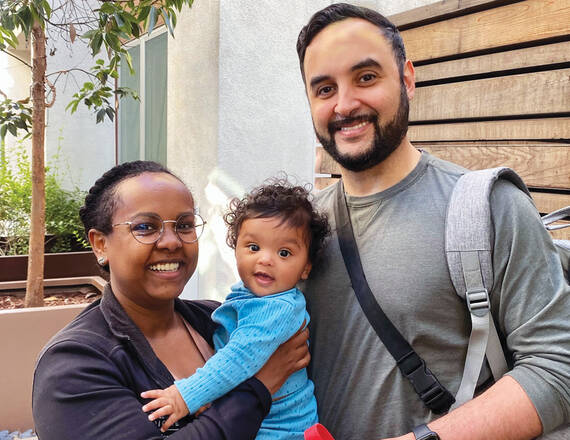A Journey to Emergency Medicine
How Geisel Scholarships Shape Medical Careers
For Joe Graterol, MD, MED ’15, the dream of becoming a doctor took root early in his childhood. Born in the U.S. to Venezuelan parents, Graterol spent his formative years between Ithaca, N.Y., and Venezuela. In Venezuela, he lived among extended family, and shadowed family members who were physicians. “Seeing so much need firsthand, I really enjoyed the idea of being able to help people through science,” he says.

Yet when it came time to pursue his dream of attending medical school, Graterol faced a seemingly overwhelming obstacle: cost.
“Our family didn’t have much in terms of built-up wealth so when I came back [to the U.S.], I lived with my godparents for a little while,” he says. “I knew a scholarship was the only way that I was going to get through medical school.”
So when the Geisel School of Medicine at Dartmouth offered Graterol the financial aid that made a medical education possible, it was a life-changing opportunity. That support paved the way for him to pursue not only a medical degree but also a career rooted in service to others. “I honestly don’t know where my career would be if I didn’t get a chance to be at Geisel, so I’m very appreciative of the people who made those scholarships possible,” Graterol says.
The Geisel scholarship opened more than just the door to medical education. It empowered Graterol to practice medicine in a way that reflects his values—providing high-quality care to marginalized and underserved populations, and inspiring future generations of doctors from similar backgrounds to do the same.
“One of the benefits of Geisel is it exposes you to a lot of different clinical contexts,” Graterol explains. “It’s not only working at Dartmouth Hitchcock [Medical Center]. You get a chance to do rotations in a lot of rural and urban areas, too. I did a rotation in Portland, Maine; one in southern New Hampshire; and another in San Francisco.”
Each of these rotations immersed Graterol in new communities and allowed him to see firsthand the diverse ways healthcare is delivered across different populations. It was his rotation in San Francisco and his involvement in The Urban Health Scholars (UHS) program at Geisel that deepened Graterol’s passion for working with underserved urban populations. “We went on trips to Boston, Philadelphia, and elsewhere to learn about health problems specific to urban areas and how different places went about solving them,” he shares.
Through the UHS program, Graterol also helped develop a comprehensive Medical Spanish and Cultural Competency program, with electives, service-learning opportunities, and other enrichment activities for Geisel students, which the school continues to offer. “Spanish conversationally isn’t the same as communicating with Spanish-speaking patients in a medical setting,” he explains.
Now, as an emergency physician in San Francisco, Graterol uses these skills often. “Being in San Francisco, I get to use [Spanish] very regularly while working at the ER and just living in a place with a large Latinx population.”
At Geisel, Graterol not only honed his clinical skills but also gained the values and tools that would define his career. “All the skills—the whole patient-centered approach Dartmouth teaches, the empathetic communication techniques like motivational interviewing—I use to this day and try to teach to all my residents and students,” he says.
Today, as assistant professor of emergency medicine at the University of California, San Francisco (UCSF), Graterol is shaping the next generation of physicians. He mentors young doctors, advocates for diversity, equity, and inclusion in medicine, and develops innovative tools to address healthcare disparities. “Much of my work is to find pathways for people with disadvantaged backgrounds to both become physicians and work within emergency medicine,” he says.
Working in the fast-paced emergency rooms of the Bay Area, Graterol sees patients “from a wide array of different backgrounds, with a wide array of different complaints.” He notes that, oftentimes, the emergency room is the gateway to care for marginalized people, who end up going because they’re unable to access care via other avenues. “A lot of what happens in the community is reflected in the ER. Social problems, substance use disorder, violence—all of this translates to the ER,” he explains. “And I’ve always felt it was important to address the root causes for why people end up in places like the emergency room.”
Graterol’s scholarly work at UCSF tackles those healthcare disparities, focusing on improving services for diverse and marginalized communities. His research includes co-creating the development of a digital equity dashboard for emergency departments, which addresses inefficiencies in patient care. During the COVID-19 pandemic, he focused his research on vaccination rates among underserved populations.
Graterol’s story is just one example of how Geisel’s scholarship program empowers students to catalyze positive change in healthcare. For the 2024-2025 academic year, Geisel has distributed $7.1 million in need-based scholarships, supporting 60% of Geisel MD students with an average of $38,791 per financial aid recipient in the class of 2028. These scholarships represent far more than financial assistance; they enable students to realize their dreams and serve communities in need.
“For me, receiving a scholarship was a paramount opportunity,” Graterol reflects. “I know the feeling of having financial hardships and how that can influence a person’s journey. So that’s inspired me to give back in whatever ways I can.”
As Graterol looks toward the future, he hopes that his journey inspires others to pursue careers in medicine, especially those from underserved backgrounds. “Being able to look ahead at someone who’s done what you’re dreaming of doing and knowing it’s possible” is powerful motivation, he says. “I have a lot of people to thank for giving me the opportunity of saying, ‘You can actually do this.’”
To learn more about the impact of scholarships on Geisel students, contact Elizabeth Dollhopf-Brown at 603-646-5792 or Elizabeth.Brown@dartmouth.edu.